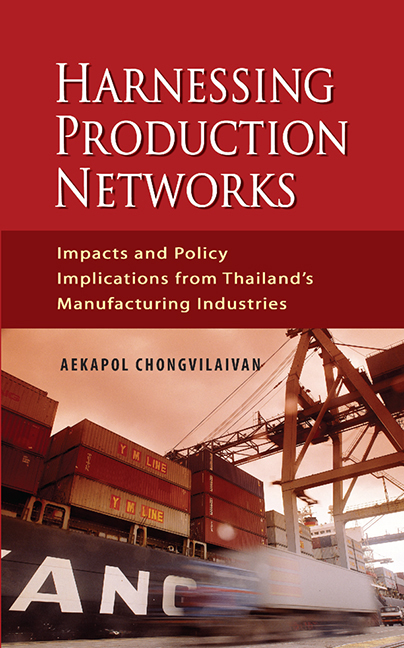 Harnessing Production Networks
Harnessing Production Networks Book contents
- Frontmatter
- Contents
- List of Tables and Figures
- Acknowledgements
- 1 Introduction
- 2 Characteristics of Firms in Thailand's Manufacturing Sector
- 3 Firm Productivity Effects
- 4 Labour Productivity Effects
- 5 Skills Upgrading: Winners or Losers?
- 6 Outsourcing Typology: Does It Matter?
- 7 Policy Implications
- Bibliography
- Index
- About the Author
2 - Characteristics of Firms in Thailand's Manufacturing Sector
Published online by Cambridge University Press: 21 October 2015
- Frontmatter
- Contents
- List of Tables and Figures
- Acknowledgements
- 1 Introduction
- 2 Characteristics of Firms in Thailand's Manufacturing Sector
- 3 Firm Productivity Effects
- 4 Labour Productivity Effects
- 5 Skills Upgrading: Winners or Losers?
- 6 Outsourcing Typology: Does It Matter?
- 7 Policy Implications
- Bibliography
- Index
- About the Author
Summary
The objective of this chapter is to explore characteristics of the establishments operating in Thailand's manufacturing industries based on the establishment-level data retrieved from the reports of the 2003 Manufacturing Industry Survey, provided by the National Statistical Office (NSO), Thailand. The main purpose of this survey is to collect basic information on industrial establishments with at least one person engaged throughout Thailand. This survey contains establishment-level information on production and cost structures such as numbers of employees, values of remuneration, raw materials, parts and components purchased, sales of goods produced, and fixed assets, among others. The information gathered contributed to the formulation of economic and industrial development policies as well as the decision-making process in both government and private sectors.
According to the survey, a manufacturing establishment refers to an establishment engaged in the mechanical or chemical transformation of substances into new products. The assembly of the component parts of manufactured products is also considered as manufacturing. Manufacturing activities are classified according to the 4-digit International Standard Industrial Classification (ISIC) Rev. 3. The survey pertained to sixty-two categories of manufacturing activities (4-digit ISIC) in twenty-three industries (2-digit ISIC).
As portrayed in Table 2.1, there were 8,862 manufacturing establishments pertinent to this dataset. Food and beverages manufactures accounted for approximately 25 per cent of the total samples and thus were the largest in terms of the number of establishments, followed by furniture (9.4 per cent), fabricated metal products (8.81 per cent) and textiles (8.80 per cent). The large numbers of establishments in these industries may suggest that the establishments encountered the high degree of competition. In contrast, office, accounting and computing machinery, recycling, refined petroleum products and tobacco were relatively less competitive as there were merely 14, 33, 36 and 47 establishments, respectively, operating in these industries.
Table 2.2 reveals the international exposure of establishments in Thailand's manufacturing industries in terms of foreign ownership, exports and use of imported intermediate inputs. These attributes have crucial implications on outsourcing decisions now that establishments with intensive exposure to foreign markets tend to find vertical disintegration less costly than domestic establishments, thanks to their superior knowledge and/or information on foreign markets and input providers (Markusen 1995 and Girma and Görg 2004). The first column reports the numbers of foreign-owned establishments.
- Type
- Chapter
- Information
- Harnessing Production NetworksImpacts and Policy Implications from Thailand's Manufacturing Industries, pp. 13 - 26Publisher: ISEAS–Yusof Ishak InstitutePrint publication year: 2011
